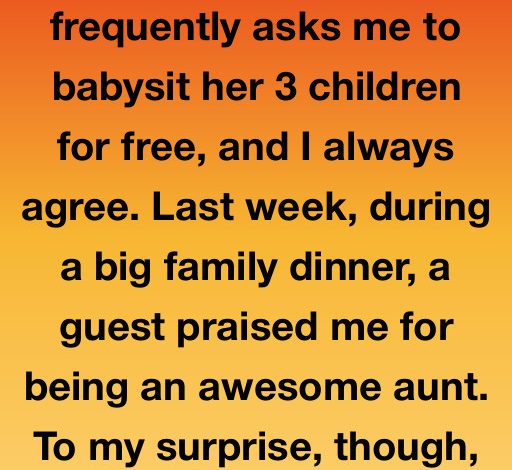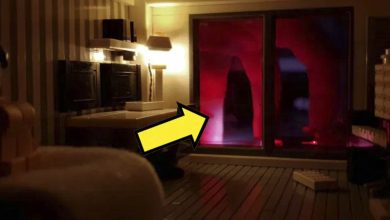The Sister Who Forgot

This is a personal story about family, boundaries, and the true meaning of appreciation. It shows how speaking up can lead to a powerful, positive change in a relationship.
ADVERTISEMENT
The Constant Favor and the Surprising Insult
I have a twin sister, Rea, and for years, I was the dedicated, go-to babysitter for her three wonderful children. I often helped her out, and it was always for free. I love my nieces and nephew very much, and I always happily agreed to watch them.
ADVERTISEMENT
One evening, during a large family gathering, a friend at the dinner table complimented me for being an amazing aunt. I felt warm inside, but then something unexpected happened. My sister, Rea, laughed it off and said something shocking: “Oh please, she just watches them when I have no one else. She complains all the time about it.”
ADVERTISEMENT
I was completely stunned. My fork stopped halfway to my mouth. All around the table, the energy shifted. My mother raised an eyebrow, my father stopped chewing, and even my quiet cousin looked up. Rea, however, kept laughing and talking as if her comment was totally normal and acceptable. I tried to hide the sudden heat in my face by forcing a smile.
The truth was very different from what she claimed. To help her, I had often dropped plans, left work early, and even canceled dates. I loved her kids like my own and never once did I complain—not to her, and not to anyone else. I did it because I genuinely cared. Hearing her dismiss my efforts so cruelly hurt me deeply. It was a pain that went deeper than I expected.
After dinner, I helped clean up while Rea chatted with relatives. I didn’t say anything to her then. But that night, as I drove home alone, I felt a quiet, heavy shift inside me. It wasn’t anger; it was a profound sense of disappointment and sadness.
Finding Freedom and Setting a Boundary
Over the next few days, I tried to convince myself that maybe she didn’t mean it the way it sounded. Maybe the words just “came out wrong.” But there was no text or call from her to apologize. It was as if she didn’t even notice the hurtful thing she had said.
Then, that Friday, she messaged me. “Hey! Can you watch the kids tomorrow? I need to go to that spa thing I told you about! Pleeease ❤️”
I stared at the message for a long time. In the past, I would have immediately said yes. This time, after much thought, I simply typed and sent a new answer: “I can’t tomorrow, sorry.”
She replied quickly with a sad face emoji and an “Okay, I’ll figure something out.”
I didn’t feel guilty, which surprised me. Instead, I felt a wonderful sense of freedom.
That weekend, I focused on myself. I made plans with friends I hadn’t seen in months. We enjoyed a relaxing brunch, shared loud laughs, and explored the charming street market downtown. For the first time in a long time, I did something purely for my own joy and relaxation.
On Sunday evening, my sister called, but I decided to let the call go to voicemail.
The next day, Monday, I received a very long message from her. She explained that because she couldn’t find anyone else, she had ended up taking the children to her spa appointment. She wrote, “It was a disaster. They knocked over a candle display. I had to pay for damages. You could’ve just helped.”
This was the key moment. I felt a twist in my chest, but it wasn’t sadness or guilt this time—it was a powerful realization. She hadn’t been asking for help; she was expecting it. And she clearly did not see or value my efforts or my life outside of her needs.
I knew I needed to have a clear, honest conversation.
The Honest Talk and the Beginning of Change
I invited Rea for coffee that Tuesday. We met at a cozy little café close to our childhood high school. She arrived ten minutes late, juggling a juice box and a backpack, looking quite tired.
“Hey,” I said gently when she sat down.
“Hey,” she replied, pushing hair back from her face. “So… what’s up?”
I took a deep breath. “I wanted to talk about dinner the other night,” I began.
She blinked at me. “Oh? What about it?”
I explained clearly how much her comment had hurt me. I told her I didn’t need praise, but I absolutely did not deserve to be described as someone who constantly complained. I repeated that I loved her children, but I needed her to respect me—not just as a sister, but as an adult with a full life of her own.
She stared down at her coffee cup. “I didn’t even realize I said that. I was just joking.”
“Yes, but no one else knew it was a joke,” I responded. “And you didn’t apologize for it later.”
A moment of heavy silence passed between us. For a brief second, I worried she would dismiss it again. But then, she finally looked up at me and spoke the words I needed to hear: “You’re right. I’ve taken advantage of you. I’m sorry.”
It felt like a heavy weight had suddenly been lifted from my shoulders.
From that day forward, things started to slowly improve. She stopped simply assuming I was available and began asking if I was free. Sometimes I said yes, and sometimes I said no, and she respected my answer every time.
Accountability Leads to Real Healing
Here is where the story takes a positive turn.
About a month later, Rea was involved in a small car accident. She was physically okay, but she ended up with a sprained wrist and some bruises, meaning she couldn’t drive or use her right hand easily. Suddenly, she needed help—real, serious help.
Initially, I stepped in right away, just like before. I picked the kids up from school and helped cook dinner a few nights a week. But this time, the atmosphere was completely different.
Now, Rea said “thank you.” She said it every single time. And it wasn’t a distracted, quick thank you. She looked directly at me and said it with genuine sincerity.
One evening, after I had helped her children with their homework, she pulled me aside. “I’ve been thinking about everything you’ve done. Not just now, but for years. And I don’t know if I ever said it right.”
I smiled warmly. “You’re definitely saying it now,” I told her.
“No, I truly mean it,” she insisted. “I have applied for a part-time nanny through the church. Just for a few hours a week. I want you to have your time back.”
That decision hit me in the very best way. Her change wasn’t just an apology in words; it was change in action.
Over the next few months, we established a much healthier, better rhythm for our relationship. We began meeting up with the children at the park on Sundays, or going grocery shopping side-by-side. We did this not because she needed a favor, but simply because we genuinely enjoyed being in each other’s company again. We became sisters again, but also real friends.
The Biggest Twist: A Gift of Mutual Love
Then, an unexpected event reinforced how much closer we had become.
One night, I received a frantic call from Rea. Her voice was shaking. “Hey. I just got a call from Dad’s neighbor. He fell in the backyard.”
We rushed over to his house. Dad had tripped on a garden hose and hit his hip hard. After the ambulance took him to the hospital, we sat in the waiting room for what felt like an endless amount of time.
As we waited anxiously, Rea turned to me and whispered sincerely, “I don’t know how I would’ve handled all this without you.”
I leaned my head onto her shoulder comfortingly. “We’re in this together. Always have been,” I replied.
Thankfully, Dad recovered well. But that scare had brought our whole family even closer. Even the children seemed more aware of how important family connections are. Rea’s youngest child, Mavi, later gave me a sweet drawing that read “Best Aunt Ever” with a picture of her brothers, her, and me holding hands. I proudly taped it right onto my fridge.
But the biggest, most amazing surprise came about six months later.
I had just returned home from work when Rea showed up at my door with a small, beautifully decorated gift bag.
“What’s this?” I asked her, surprised.
“Open it,” she urged.
Inside the bag was a heartfelt card that read: ‘To my sister, my best friend, and the greatest aunt: Thank you for always being there. You deserve the world—and maybe a break too.’
Under the card was a plane ticket. It was a one-week, paid-for, solo trip to Italy.
“I’ve been saving up,” she said, beaming at me. “And I already hired someone to watch the kids for that whole week. I want you to go. No excuses.”
I couldn’t stop the tears that came right there in my kitchen.
“I don’t even know what to say,” I managed.
She hugged me tightly. “You don’t have to say anything at all. Just go make some wonderful memories—for you this time.”
That trip was life-changing. Not only because Italy is truly magical, but because it reminded me what it felt like to live fully for myself. I felt present, happy, and restored when I came back. And Rea kept her promise. She never returned to her old ways. She continued to ask, not assume, and she began to offer help as often as she accepted it. We were no longer just helpers to each other; we were genuinely sisters and friends once more.
Looking back, I realized the initial, hurtful dinner comment wasn’t just a terrible moment—it was a necessary wake-up call. Sometimes, a small break in the wall is needed for the light to finally shine through.
I know not every family story ends with a heartfelt apology and a plane ticket. But when people are given the chance to change and they choose to take it, that story deserves to be shared.
Family relationships can often be complicated and messy. But when genuine love wins out over pride, and when true accountability replaces expectation, it creates a powerful and lasting kind of healing.
If you are reading this and feeling underappreciated in any relationship, I want you to know: I see you. Have the courage to speak your truth. You truly never know what positive change it might open up.
And if you realize you have taken someone important for granted, today is the perfect day to say, “Thank you. I’m sorry. I promise I’ll do better.”
The real reward in this story wasn’t the trip or the specific thank yous, but the profound sense of mutual love and respect that finally became real between us.
Thanks for taking the time to read this story. If it resonated with you, please consider sharing it with someone you care about. Maybe this message will open a door or be the light someone else needs right now. If this story made you feel something, please like the post. We all need more true stories about hope and healing.




